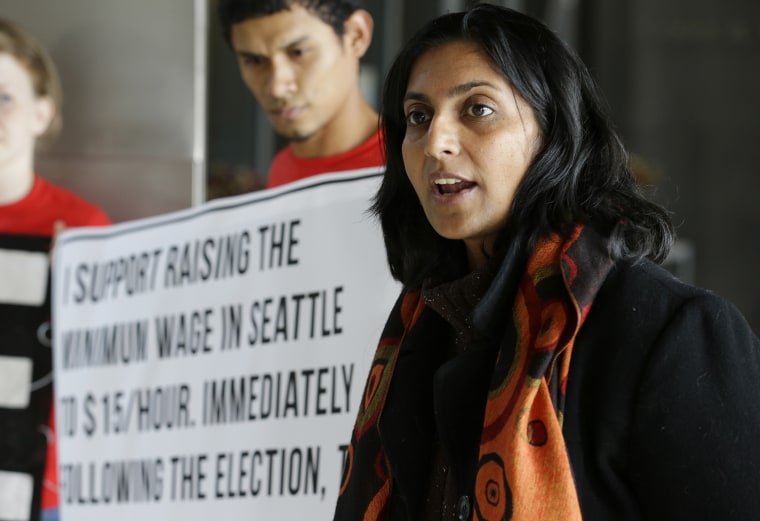For the first time in at least a century, a socialist appears poised to enter the city council in Seattle, Washington. Kshama Sawant, who is running as a member of the Socialist Alternative party, now leads 16-year Democratic incumbent Richard Conlin by a margin of 0.67%, according to the latest results from King County Elections.
Election officials say there are still about 14,000 ballots to be looked at, and Sawant leads by a scant margin of 1,148 votes. But for the past few days, each new tally has been in Sawant's favor: on Tuesday, she gained a microscopic 41-vote lead, which turned into a 402-vote lead the following day. The latest numbers, showing an advantage of over 1,000 ballots, were posted on Thursday. One local publication, the Seattle Post-Intelligencer, has already called the race for Sawant.
Socialist candidates have won local elections in the United States many times before, said The Nation's John Nichols, the author of a book about the history of socialism in America. But for at least half a century, "it's been less and less common." According to pollster Stuart Elway, a socialist victory in Seattle would be completely unprecedented.
"Socialists do win, 'out' socialists, in America," said Nichols, citing the one socialist member of Red Bank, N.J.'s school board. "It's not unheard of. But Seattle is a very big city with a very entrenched politics." Red Bank is about 2% the size of Seattle.
Sawant was not the only socialist candidate to make a strong showing in a major American city during this cycle. Minneapolis city council candidate Ty Moore also ran on the Socialist Alternative party line, and came within 229 votes of victory. He conceded five days after Election Day.
Sawant and Moore's campaigns were fueled in part by the declining stigma attached to the word "socialist." A 2011 Pew poll found that young people felt slightly more positively towards socialism than towards capitalism, while a 2012 Rasmussen survey found that nearly one-quarter of the U.S. overall has a favorable opinion of socialism.
“Young people are more comfortable voting for a wider range of ideological options," said Nichols, who traveled to Seattle to cover the Sawant campaign. "And it's not just the word 'socialist;' it's also the word 'libertarian' that does much better with young people than with old."
But it's not just ideological labeling that attracted voters to Sawant, he said. "She's winning, I think, because of the issues she ran on."
Those issues include a call for a $15 minimum wage, campaign finance reform, and a sharp critique of increasing inequality.
"The working class is fed up with the ravages of the recession, the proliferation of low wage jobs in Seattle," Sawant told msnbc shortly after Election Day. "Affordable housing is in a huge crisis and we're facing a steady decline in the standard of living."
This election, said Nichols, reflects some Americans' growing desire for a politics with "more energy, more depth, and more possibility."
"Whatever you want to call the ideology, it's a rejection of austerity as a way out of our current economic circumstance, and that's a big, big deal," he said.
Read msnbc's previous coverage of the Sawant campaign, and tune into All In with Chris Hayes tonight at 8 p.m. to see Sawant discuss the race.
